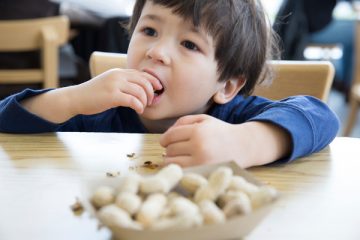7 – 8 a.m. – Breakfast/Registration/Vendors
 Keynote
Keynote
8 a.m. – The Impact of diet on the Human Microbiome
Jssef Neu, MD
Outcomes
- Understand how early life events can affect the microbiome and its relation to health and disease.
- Understand and implement dietary principles in your practice as a potential therapeutic modality that can be used to alter the composition and function of the gut microbiome.
NICU – Plenary Session
9:00 a.m. – Changing Culture to Increase Breast Milk in the NICU – Christine Bixby, MD
Outcomes
- Understand the comorbidities associated with the premature infant and why breast milk is the gold standard for feeding this high-risk population.
- Learn the physiology of breastmilk (how breasts make milk).
- Establish and maintain breast milk supply and move towards more breastfeeding in your NICU.
9:45 a.m. – Break
10:00 a.m. – In the OR with Dr. Yu: Surgical Cases in the Neonate – Peter Yu, MD
Outcomes
- Discuss anatomy of patients with common surgical diagnoses including TEF, CDH, abdominal wall defects, and intestinal atresias.
- Implement best practices for peri-operative management of the surgical neonate in the NICU setting.
10:45 a.m. – Nutrition for the Surgical Infant – Gina O’Toole, MPH, RD, CNSC, CLEC
Outcomes
- Review the nutritional management of surgical patients in the neonatal intensive care focusing on early nutrition support for healing, immunity and preservation of lean body mass.
- Implement strategies to optimize parenteral nutrition support while minimizing long term TPN associated cholestasis.
- Incorporate feeding guidelines into the surgical NICU to improve the care and outcomes of neonates.
11:30 a.m. – Sham feedings – Karin Mitchell, MA, CCC-SLP
Outcomes
- Manage the introduction of oral feeds in the high risk surgical infant using sham feedings.
12:00 p.m. – Lunch/Vendors
 Allergy – Plenary Session
Allergy – Plenary Session
1:00 p.m. – Diagnosis, Medical and Nutritional Management of Food Protein-Induced Enterocolitis Syndrome (FPIES) – Marion Groetch, MS, RDN, & Matthew Greenhawt, MD, MBA, MSc
Outcomes
- Define different clinical phenotypes of food protein-induced enterocolitis syndrome.
- Incorporate clinical management strategies for patients diagnosed with FPIES including acute episodes due to the ingestion of a culprit food, introduction of at-risk foods, nutritional management, and development of tolerance through review of clinical vignettes.
- Counsel families on appropriate introduction of solid foods considering risk of allergic reaction, nutritional adequacy of the diet, and development of age appropriate feeding skills.
2:00 p.m. – Appropriate Timing & Content of Complementary Feeding to Reduce the Risk of Allergic Disease – Sean McGhee, MD
Outcomes
- Follow the updated guidelines for allergy prevention and describe the evidence supporting them.
- Counsel families on appropriate introduction of complementary foods in low-risk and high-risk infants.
3:00 p.m. – Break
3:15 p.m. – Breakout Sessions
Participants will have an opportunity to visit one of the three sessions.
A. Designer/Homemade Formulas: A Case-based Discussion – Stephanie Lauri, RD, CLEC
Outcomes
- Counsel families on risks, benefits and safe use of homemade infant formulas.
- Manage complications of inappropriate use of homemade infant formulas through case study review.
B. Elimination Diet for Breastfeeding – Marion Groetch, MS, RDN
Outcomes
- Identify when a trial of an elimination diet for a breastfeeding mother is warranted.
- Counsel breastfeeding mothers on elimination diets avoiding unnecessary removal of foods and assuring nutritional needs are met.
C. Feeding Issues in the Post-NICU Grad – Erin Karavedas, MS, OTR/L, SWC, PAMS & CHOC RD
Outcomes
- Manage the feeding challenges of premature infants by utilizing evidenced-based strategies to promote success after discharging home from the NICU.
- Oversee progression of feeding and nutritional prescription in a NICU graduate (changing flow, increasing breastfeeding sessions, and modifying nutrient composition).
- Identify resources available and how to refer to a feeding therapist/rehab program when needed.
4:00 p.m. – Break
4:15 p.m. – Medical and Nutritional Management of Eosinophilic Esophagitis in Infants and Toddler – Ellen Schonfeld, CPNP
Outcomes
- Recognize the clinical presentation of infants and toddlers with EoE and associated complications of the disease.
- Manage eosinophilic esophagitis by appropriately prescribing evidenced-based medical and nutritional therapeutic treatment options that aim to reduce clinical symptoms, biopsy-based eosinophil counts and associated visual and histologic tissue changes while optimizing the patient’s nutrition and quality of life.
 Feeding Problems – Plenary Session
Feeding Problems – Plenary Session Nutrition Lab & Breast Milk – Plenary Session
Nutrition Lab & Breast Milk – Plenary Session Keynote
Keynote Allergy – Plenary Session
Allergy – Plenary Session











